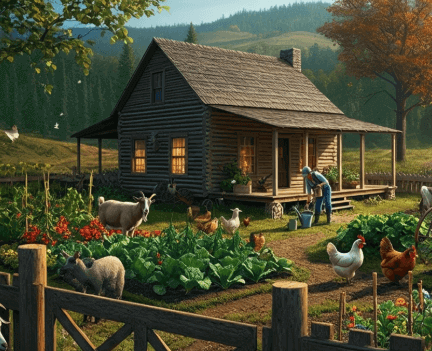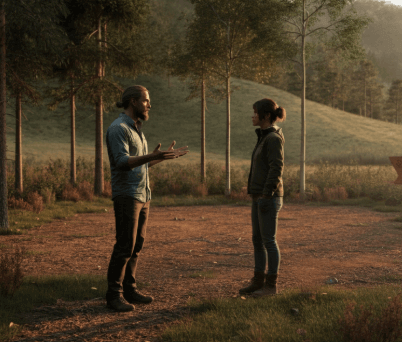Starting your homesteading or off-grid living adventure begins with one critical step: buying land for homesteading or off-grid living that fits your goals and needs. Over 125 million acres in the U.S. were claimed and transformed into private property during the Homestead Act era, showcasing the enduring desire for self-sufficient living. Buying land for homesteading or off-grid living involves understanding factors like zoning laws, soil types, and whether utilities are available or need development. Did you know that some states are ideal for off-grid potential due to optimal rainfall levels, lower population density, and affordable land costs? Steve Daria and Joleigh, renowned real estate investors and land buyers for cash, have helped countless individuals identify the perfect properties for sustainable living. With their expert guidance, you’ll save time, avoid costly mistakes, and make sound decisions to start your off-grid lifestyle. Whether you’re dreaming of a serene forested tract or open plains for farming, having the right professionals on your side is key. Book a free discussion with Steve and Joleigh today to make your dream a reality!
What is homesteading, and how does it differ from off-grid living?
Homesteading and off-grid living are lifestyles centered on self-sufficiency, but they are not exactly the same.
Homesteading is about living sustainably by growing your own food, raising animals, and making essentials like soap or clothing.
It often involves buying land for homesteading or off-grid living, where the property can support agricultural activities.

On the other hand, off-grid living refers to living independently of public utilities like electricity, water, and sewage systems.
People living off-grid often rely on renewable energy sources, such as solar or wind, and create water collection and waste management systems.
While homesteading can happen on or off the grid, off-grid living does not always include homesteading practices like farming.
Both lifestyles share a goal of reducing dependency on external resources and taking control of daily living needs.
When buying land for homesteading or off-grid living, it’s essential to consider key factors like water availability, fertile soil, and zoning regulations to ensure the land aligns with your objectives.
Ultimately, the two approaches can be complementary, helping you achieve a more grounded and independent way of life.
Get Started: Get Your Cash Offer Below…
We are direct land buyers. There are no commissions or fees and no obligation whatsoever. Start below by sharing where your property is and where we can send your offer…
What are the benefits of buying land for homesteading or off-grid living?
Buying land for homesteading or off-grid living provides numerous advantages for individuals pursuing a simpler, more self-sufficient way of life.
One big advantage is the ability to grow your own food and raise animals, which can help you rely less on grocery stores and save money in the long run.
This lifestyle also allows for a closer connection to nature, offering peace and a slower pace of life that’s often hard to find in urban areas.
Purchasing land for homesteading or off-grid living allows you to create a sustainable home using renewable energy like solar or wind power.
Living off the grid can significantly lower utility bills and reduce your carbon footprint.
Additionally, owning land gives you more control, as you can shape the property to meet your needs, whether farming, building, or crafting a self-sufficient water system.
Many people find a sense of accomplishment and fulfillment in achieving independence through homesteading or off-grid living.
Finally, this type of investment often holds its value and can be passed down through generations, providing long-term security and a lasting legacy.
What should I look for in off-grid properties before buying?
- Water Availability: A dependable water source is essential for off-grid living. Look for land with a well, stream, pond, or access to clean water for household use, irrigation, and animals.
- Good Soil Quality: Check if the soil is fertile enough for growing food and supporting plants. Healthy soil is vital for a successful homestead and ensures you can grow crops without too much hassle.
- Energy Options: Consider the potential for generating renewable energy, like solar or wind power. If you plan to harness these natural resources, look for open spaces with plenty of sunlight or consistent wind.
- Proximity to Town or Services: While off-grid living values independence, it’s useful to be within reasonable driving distance of a town. Access to essentials like groceries, medical care, and building supplies can make your experience easier.
- Land Zoning and Legal Requirements: Make sure the land is zoned for off-grid living or homesteading. Check for building structures, alternative energy systems, and water use restrictions to ensure the property meets your needs.

How do I evaluate soil quality and water access for a homesteading property?
When buying land for homesteading or off-grid living, evaluating soil quality and water access is crucial since they directly affect your ability to sustain yourself on the land.
To check soil quality, look for rich, dark, loose, crumbly soil, as this indicates healthy nutrients for growing crops.
You can also test the soil’s pH level using an affordable soil testing kit to ensure it’s not too acidic or alkaline for your desired plants.
Pay attention to any signs of erosion or compacted dirt, which might make farming difficult.
Find properties with reliable resources for water access, like a stream, pond, well, or spring.
If there isn’t a water source on the land, consider how easy it would be to install a system to collect rainwater or drill a well.
Ensure the water is clean and safe by having it tested for contaminants.
Having fertile soil and dependable water access will make your homesteading or off-grid living experience much smoother and more sustainable.
What permits or licenses might I need to start homesteading?
- Building Permits: If you plan to build a home, barn, or any other structure on your property, you may need a building permit. Regulations differ depending on your location, so consult your local government to ensure your plans align with safety requirements and zoning standards.
- Septic System Permits: Installing a septic system for waste management often requires a permit. Local health departments need to assess the ground and ensure proper installation to protect the environment and public health.
- Well or Water Permits: If your homestead requires drilling a well for water, you may need a permit. This ensures the water source is safe and doesn’t interfere with existing water systems in the area.
- Agricultural or Livestock Licenses: Depending on your region, you might need a license to raise certain types of livestock or grow specific crops. These permits help regulate animal welfare, food safety, and land use.
- Home-Based Business Permits: If your homestead also serves as a business, such as selling products or hosting visitors, you might need a home-based business license. This helps ensure your activities comply with local zoning laws and business regulations.
What’s the process for purchasing land for homesteading or off-grid living?
Buying land for homesteading or off-grid living can be an exciting but detailed process.
First, you’ll want to decide on an ideal location based on factors like climate, accessibility, and nearby resources.
Then, research zoning laws and land regulations to ensure you can legally use the property for homesteading or living off-grid.
It’s important to assess the land’s features, like soil quality, water access, and renewable energy potential, to ensure it supports your needs.
You’ll also need to evaluate the land’s size and layout, making sure it’s suitable for farming, building, or other projects you may have in mind.
After identifying a property, consider working with experts like Steve Daria and Joleigh, seasoned real estate investors and land buyers for cash, who can help you find land that meets your goals.
Once the property purchase is complete, you can transform your land into a self-sufficient haven.
Take the first step towards making your homesteading dream a reality by reaching out to trusted professionals like Steve and Joleigh today!
Takeaway
- Choose the Right Location: The location of your land determines key factors like climate, access to resources, and community support. Make sure to pick an area that aligns with your needs for self-sufficient living.
- Understand Zoning Laws and Restrictions: Due to zoning regulations, not all land can be used for homesteading or off-grid living. Research local and state laws to ensure your plans for farming, building, or generating renewable energy are allowed.
- Evaluate Water and Soil Quality: Reliable water access and fertile soil are essential for growing crops and sustaining a homestead. Look for properties with clean, accessible water sources and soil that supports your agricultural goals.
- Consider Accessibility and Utilities: Even off-grid properties need a level of accessibility for building materials, emergency services, or selling products. Understand how you’ll access the land and plan for alternative energy or water systems if utilities aren’t available.
- Work with Real Estate Experts: Finding the right property can be complicated, so teaming up with real estate professionals can make the process much easier. Experts like Steve Daria and Joleigh, who specialize in land purchases, can help you find, negotiate, and close on the ideal homesteading property.
**NOTICE: Please note that the content presented in this post is intended solely for informational and educational purposes. It should not be construed as legal or financial advice or relied upon as a replacement for consultation with a qualified attorney or CPA. For specific guidance on legal or financial matters, readers are encouraged to seek professional assistance from an attorney, CPA, or other appropriate professional regarding the subject matter.
